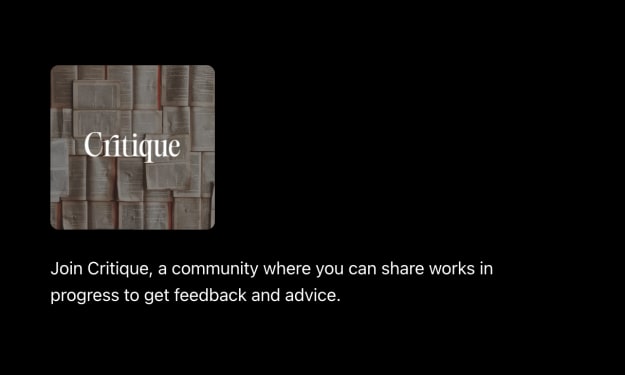
*If you want to skip ahead to the part I want feedback on, scroll down to the header labeling the drafted poem below.
Lately, I have been having trouble with endings. Starting poems or prose is the easy part. A line comes to me and often starts as a quick note in my phone. It's easy to run with it, but where do I stop and how?
I find myself asking a lot of questions like that. When does it sound complete? When do I have too many metaphors, and when do they stop making sense together? Do they all make sense on their own in the first place?
From scrolling through the comments on other posts so far, it seems like this new community is supportive and reminiscent, in spirit, of my creative writing workshop days in college. There is no easy way to fully replicate that environment, but I'm excited to see what this new addition to Vocal becomes.
Part of that is what we choose to do with this space as Vocal contributors. Will we support each other and keep up with the commitment to give consistent feedback in the comments? Will we provide real, constructive feedback or focus on positively cheering each other on? When we share our own writing here, will we post one full draft, snippets of a piece of writing in progress, or multiple poems for feedback in one post?
I'm also curious to see if we'll see any changes to this community from the Vocal team as it grows. Most of what I publish on Vocal is poetry, which allows for a significantly lower minimum word count for submitted pieces compared to other communities. So far, the 600 minimum word count appears to remain in place for the Critique community.
It would be helpful to extend that lower minimum word count exception here as a place for drafts, both to include poetry but also to allow for critiques on microfiction and smaller pieces of developing stories. The poem I have been stuck on for the last week, for example, does not meet the minimum word requirement for this community on its own. Regardless, I want to try to get input on the piece as it is and ideas for what direction might be best for revisions moving forward.
This is my latest draft, and I would love some feedback:
You left a mess for me to clean up on my own, and I'm still working through it.
Weeks later, the empty cans are still where you left them on the floor. Swiss cheese is growing mold in the fridge. The plants are dead on the window sill, but I threw out your loofa and took the pictures off the fridge.
I'm taking steps, picking up the mental clutter first this time. The love wasted on you evaporated, cycled through to water my growing independence, and it is blooming with newfound freedom.
The barriers built of "I can't" and "they won't let me" and "they'll be mad if I" have crumbled. New pathways have opened, and I am skipping along without your hands around my throat to keep me in place.
Every "I miss you" has reached a landfill by now, silently replaced by "thank you, good riddance" to match the new kettle that came in the mail.
All that's left is to fill a few trash bags and leave them with you and your carelessness on the curb.
Background on the piece:
I wanted to work with the idea of picking up mental clutter and how that kind of productivity can be invisible compared to picking up any kind of physical clutter. Does this come through effectively? Does the ending tie both concepts back together in a way that feels final enough?
Let me know in the comments what you think or if you have any revision strategies that might be helpful as I work toward a final draft. (And thank you in advance!)






Comments (1)
My two cents on when a poem is complete: poetry being the art of condensation, where ideally every word is indispensable, I would always prefer pruning over inclusion, on principle. So that a poem is complete when it has only those words (and thus the metaphors, conveyed feelings, etc.) left that you can no longer remove. With that in mind, I wonder if your poem needs the first phrase to frame and explain it: when I read the draft without it, the text still conveys your theme, but the “in medias res” effect is more pronounced, which I think is a good thing. In addition: As a general rule (and whenever possible in context), abstract or general ideas should be expressed through imagery and detail instead, inviting the reader to make the transition from the senses to concepts. And the first phrase here is somewhat abstract (at least “working through” is, referring as it does to a mental process). Without it, the reader would see the illustrative details first, painting a concrete picture of what you now start by stating in general terms. One of the things I appreciate the most about your draft is how you turn phrases (e.g., “they won’t let me”) into nouns/things. That is because it is an atypical form of expression and makes fruitful use of syntactic possibilities. And in poems a big part of the charm is often a distinctive idiom. I also like the nigh-syllabic alliteration, one further emphasized by its placement at the end. The point about abstraction would also hold of “independence” and “newfound freedom”: showing rather than telling would be more expressive—such concepts being precise at the cost of color and freshness. They are far from easy to illustrate, but even metaphors (along the lines of chains broken, breathing-space, etc.) would be more expressive, convey more. I’m not sure whether your flower metaphor in the 3rd stanza is a distraction from the comparison that runs through your poem (thus clogging the text somewhat with extended metaphors) or whether it is well-justified as a juxtaposition with the mention of dead plants. To me the strongest (part of a) phrase is “I am skipping along without your hands around my throat to keep me in place.” The reader is surprised by the sudden violent imagery, but the image itself is also surprising: odd in a good way and as if tinged by irony. I also like “. . . to match the new kettle that came in the mail”: in answer to your question, I think it is in this phrase that you bring the physical and the mental together in a satisfactory way.